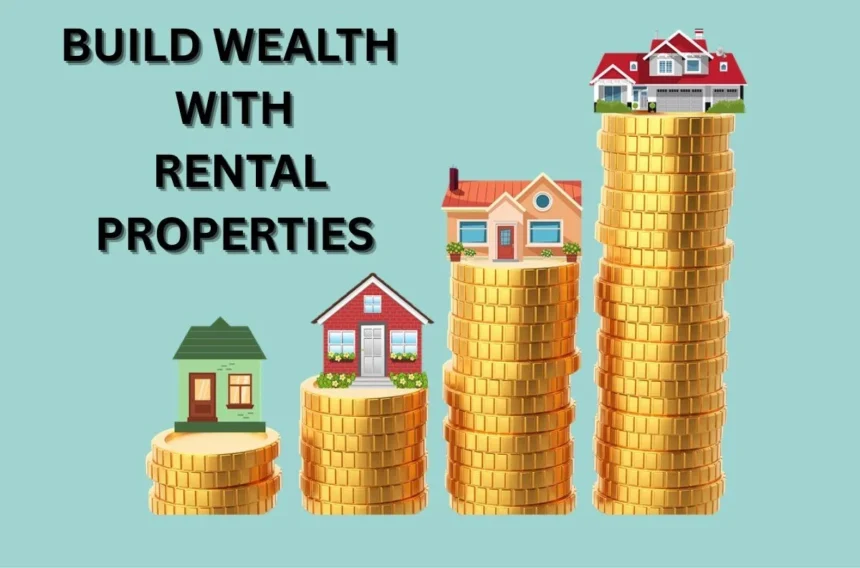Building a rental property portfolio that makes you money isn’t about grabbing any house and throwing it up for rent. It’s a grind, but a smart one if you do it right. You gotta plan, hunt for the right spots, and make sure your numbers add up so you’re not bleeding cash. Whether you’re starting with one place or dreaming of owning ten, this is how you make it work without screwing yourself over. I’m gonna break it down step-by-step—finding good properties, dealing with tenants, covering your ass financially, and growing without crashing and burning.
Figure Out Your Game Plan First
Don’t even start scrolling Zillow till you know what you’re after. Are you trying to pocket extra cash every month, or are you betting your properties will be worth more down the road? Maybe both? This decides what kind of places you buy and where. If you’re all about monthly cash, look for cheaper houses or duplexes in areas where people need rentals. If you’re playing for big value growth, go for hot markets where prices are climbing.
Get a pen and jot it down. Be real with yourself: “I wanna own four houses in five years, each pulling in $400 a month after bills.” Then check your wallet. How much cash you got for down payments? Can you swing a loan, or are you thinking outside the box like teaming up with someone or getting the seller to finance you? Hit up a bank or lender early to see what you qualify for. Getting pre-approved means you’re ready to jump on a deal when it pops up.
Big mistake people make: they don’t plan for shit hitting the fan. Keep some cash stashed—like 10% of what your properties are worth—for surprises like a busted water heater or a tenant bailing. If you’re broke, one bad month can wreck you.
Choose a location that’s worth it
Where your property is matters way more than how pretty it looks. A fancy house in a sketchy area will sit empty or pull in tenants who cause headaches. You want places where people actually wanna live—near jobs, decent schools, maybe a bus stop or train station. Check what’s going on in the area: are new businesses opening? Are people moving in? You can dig up stats on sites like the Census Bureau or your city’s website to see if the population’s growing or if jobs are sticking around.
Don’t just chase the cheapest house. A $60,000 place might seem like a no-brainer, but if it’s in a ghost town, good luck finding renters. Go for “B” or “C” neighborhoods—safe, working-class spots where rents are solid but you’re not paying crazy prices like in ritzy areas. Think suburbs near growing cities like Nashville or Raleigh. Drive through the area yourself. Talk to people at a coffee shop or gas station. Is the place clean? Are there a ton of “For Rent” signs? Too many empty houses means trouble.
Check what rents are like on sites like Zillow or Craigslist. If a house costs $150,000 but rents for $1,200, and your bills eat up $1,100, that’s barely worth your time. You want enough left over to make it worth the hassle.
Do the Math Like It’s Your Job
Buying a rental isn’t like picking a house to live in. It’s a business, and you gotta make sure it pays. A quick trick is the “1% rule”: monthly rent should be at least 1% of what you paid for the place. So, a $200,000 house better rent for $2,000. It’s not a must, but it weeds out crappy deals fast.
Here’s how to run the numbers:
- What You’re Paying: Add up the house price plus closing costs (like 3-5% extra for fees and stuff).
- What You’re Making: Look at what similar places rent for. Don’t get cocky—assume you’ll get 10% less than the top rents.
- What It Costs: List every damn thing:
- Mortgage payment (check online calculators).
- Property taxes (look up the county’s rate).
- Insurance (landlord policies cost more—get a quote).
- Repairs (budget 1-2% of the house’s value a year).
- Property manager (10% of rent if you hire one).
- Vacancy (figure one month empty a year, so 8% of rent).
- What’s Left: Rent minus costs is your cash flow. Shoot for $200-$400 a month per property. Under $100? Pass.
Say you buy a $140,000 house that rents for $1,400. Mortgage (20% down, 5% rate, 30 years) is $590 a month. Taxes $180, insurance $90, repairs $120, manager $140, vacancy $110. Total costs: $1,230. You pocket $1,400 – $1,230 = $170. That’s okay, but if taxes jump or a pipe bursts, you’re cutting it close.
Test your numbers hard. What if rent drops? What if you need a new AC unit for $4,000? If the deal only works when everything’s perfect, it’s a trap.
Get Properties That Don’t Scare Tenants Away
Not every house makes a good rental. Single-family homes are solid for families who stick around, but they cost more to fix up. Duplexes or triplexes are clutch because you get multiple rents from one property—if one tenant splits, you’re not totally hosed. Small apartment buildings can work too, but they’re a bigger pain to run.
Go for places that don’t need constant babysitting. Newer houses or ones already fixed up save you from early headaches. Skip the “handyman special” unless you’re good with tools or got a contractor you trust—reno costs can eat you alive. Look for stuff tenants love: parking spots, a washer-dryer hookup, maybe a yard. Those bump up your rent and pull in better people.
Pro move: hunt for “turnkey” properties. These are ready-to-go places, already rented, usually sold by other investors. They cost more, but you’re making money day one, and you can see how the current tenants are doing to avoid surprises.
Pay for It Without Going Broke
Unless you’re sitting on a pile of cash, you’ll need a loan. Regular mortgages are fine—go for fixed rates (15 or 30 years) so your payments don’t surprise you. Put 20% down to skip extra fees like PMI, which can add $150 a month. If cash is tight, check FHA loans if you qualify; they let you put down less, but you gotta live in the property for a bit first.
You can get creative too. Some sellers will finance you themselves—basically, they’re the bank. It’s rare, but it skips a lot of red tape. Or team up with someone who’s got cash or know-how and split the profits. Just get a lawyer to write up a deal so you don’t end up hating each other.
Don’t borrow like a maniac. If you’re drowning in loans, one bad tenant or a slow market can bury you. Keep your debt low—your monthly payments (including personal stuff like car loans) shouldn’t be more than a third of your income. Banks hate risky borrowers, and you should too.
Choose tenants as carefully as you would cast for a movie.
Shitty tenants will ruin your life. They don’t pay, wreck your place, or start fights with neighbors. Screen them like you’re Sherlock. Check:
- Credit: 600 or higher is good, but don’t freak out over a 580 if they’ve got a steady job.
- Paycheck: Their monthly income should be 3x the rent. $1,500 rent needs $4,500 in income.
- Past Landlords: Call the last two landlords, not just the current one—they might lie to ditch a bad tenant. Ask about late rent or damage.
- Background: Use sites like MyRental to check for evictions or criminal stuff. Recent felonies or evictions? Hard pass.
Meet them face-to-face or on Zoom. You’ll vibe if they’re legit or sketchy. Be fair—don’t break any laws about who you rent to. And always use a lease. Pay a lawyer to make one that covers rent deadlines, late fees (like 5% after a week), and rules (no dogs, no loud parties). Make it clear who pays for what—water, trash, lawn care.
Manage your properties without losing your mind.
You can manage your places yourself or pay someone. Doing it yourself saves cash but sucks up time—think 2 a.m. calls about a clogged toilet. If you’re DIY, use apps like TenantCloud to keep track of rent and repairs. Answer tenants fast (within a day) and check the property every six months to spot issues.
Hiring a property manager costs 10% of rent but keeps you sane, especially if you’ve got multiple places or live far away. Grill them like a tenant—call their references, ask about extra fees (some charge for every little fix), and make sure they know the area. A lazy manager’s worse than none.
Find good repair guys. A plumber who shows up and doesn’t rip you off is gold. Ask other landlords who they use, and always get a couple quotes for big jobs.
Grow Slow and Steady
Once your first place is making money and running smooth, think about adding another. Don’t go wild—buying too fast can leave you strapped. One new property every year or two is a good pace while you figure shit out.
Try the “BRRRR” trick to grow faster: Buy a cheap fixer-upper, fix it, rent it, refinance to pull your cash out, and use that for the next one. It’s tricky and not for newbies, but it lets you scale without needing a ton of money.
Mix up your properties to play it safe. Get some houses, a duplex, maybe a small apartment building. Spread them across different areas so if one neighborhood tanks, you’re not screwed. Use your profits to pay off loans quicker or save for more down payments—not to buy a fancy watch.
Don’t mess these up
Newbies always trip on the same stuff. Avoid these:
- Buying with Your Heart: Don’t fall for a cute house if the numbers suck. Math over feelings.
- Cheap Insurance: Get landlord insurance. It covers tenant damage or lost rent, unlike regular policies.
- Ignoring Fixes: A small leak turns into a $5,000 mold problem. Handle repairs fast.
- Low Rent: Check what others charge every year. A $50 rent hike is $600 more a year.
- Sloppy Legal Shit: A bad lease or no paperwork makes evicting a nightmare. Dot your i’s.
Sneaky Tips to Get Ahead
Most landlords wing it. You can do better with some extra effort:
- Data Dive: Sites like City-Data show you crime stats, school ratings, or who’s renting in an area.
- Section 8: Look up HUD’s Fair Market Rents to see what government programs pay. Section 8 tenants can mean steady rent.
- Local Crew: Hit up landlord meetups (check Meetup.com). You’ll hear who’s got the best loans or which contractors don’t suck.
One slick move: rent to niche folks like traveling nurses or company workers moving for a job. They pay higher rents for short stays (3-6 months) and treat the place well. Call local hospitals or big businesses to see if they need housing for staff.
In The End
Building a rental portfolio that pays off is a marathon, not a sprint. Start with one solid property, make sure it’s cash-flowing, and don’t bite off more than you can chew. Be picky about where you buy, who you rent to, and what you spend. Over time, you’ll have a setup that’s making you money while you’re chilling. Just don’t think it’s gonna happen in a month, and always keep some cash ready for when things go wrong.




